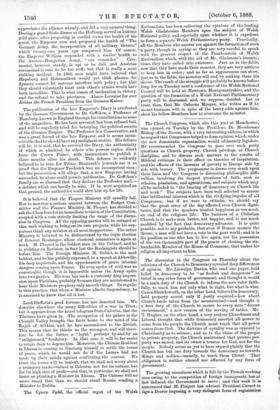The discussion in the Congress on Thursday about the relations
of the Church to Democracy revealed deep differences of opinion. Mr. Llewelyn Davies, who read one paper, held belief in democracy to be "as foolish and dangerous" as belief in any other form of government, and thought it would be a main duty of the Church to inform the new ruler faith- fully, to teach him not only what is right, but what is wise. Canon Shuttleworth, on the other hand, believed in democracy, held property sacred only if justly acquired—how about Church lands taken from the monasteries P—and thought it a first duty of the Church to secure to every man " decent environment," a new version of the serving of tables. Mr. T. Hughes, on the other hand, a very zealous Churchman and Liberal, thought that while democracy asserted all power to come from the people, the Church must teach that all power comes from God. The doctrine of equality was as opposed to Christianity as to science ; and as to the claim of the people to private property, the Church maintained that private pro-- party was sacred, and its owner a trustee for God, not for the people. Nobody seems as yet to have argued plainly that the Church has but one duty towards the democracy as towards Kings and nobles,—namely, to teach them Christ. That obligation is neither altered nor affected by any form of government.


































 Previous page
Previous page